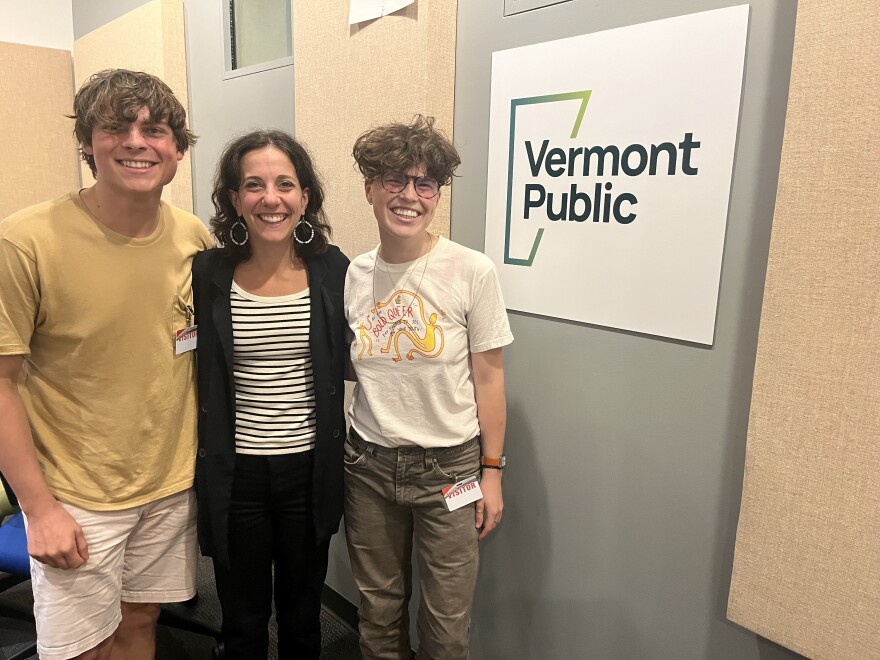Remote schooling, quarantine and the overall upheaval of the COVID-19 pandemic helped three young Vermont activists find the time and space they needed to work on issues they believe in.
Speaking on Thursday's Vermont Edition, the three activists detailed their paths to organizing around climate change, racial justice and LGBTQ rights.
Addie Lentzner of Bennington said she would sit at home during virtual learning with school on one screen and the news on the other screen. She realized there was little relation between the two, and noted a lack of diverse perspectives in the curriculum and a lack of education about issues such as climate and race, even while events such as the murder of George Floyd got many involved in the Black Lives Matter movement.
"It was really hard for me to especially go through the COVID years because I was completely virtual for two years. That allowed me time to sort of look at what I was being taught and critically examine it," Lentzner said. She founded the Vermont Student Anti-Racism Network in the summer of 2020 and serves as the group's president.
All three activists acknowledged the value of formal education, but said breaks due to COVID-19 freed them up to pursue other interests.
"I got really into organizing over the quarantine part of the pandemic," said Elio Farley, noting that his schoolwork as a senior in high school could be done in a couple of hours. He launched into participating in groups including the Sunrise Movement in Middlebury and the farmworker advocacy group Migrant Justice.
Farley is now a queer youth advocate with the Middlebury Teen Center and coordinator of MiddPride. He also chose to take time off of Middlebury College last fall to focus on progressive political communication and organizing.
Chase Desroches of Jeffersonville was in ninth grade when schools first shut down due to the pandemic, and he said he had a “huge awakening moment” that ultimately led to climate activism.
“I was like, ‘What do I do with all this extra time?’ And like, ‘Why is everything seemingly going wrong?’ So, you know, I really took that as an opportunity to explore and learn more about the world around me,” Desroches said.
Last year, at age 17, Desroches began developing the idea of a climate-focused festival, despite not knowing much about the logistics it would entail.
"I had this defining realization moment of like, you know what, nobody's going to do it," Desroches said. "Nobody's going to do it until I choose to do it."
After taking some days off school to work on the idea — and finding, to his surprise, that his English teacher's lessons about how to write an email were actually useful — Desroches is now a co-organizer of the climate-focused Vermont Future Fest and a rising first-year student at Castleton University.

Further highlights from each guest in the conversation are below. Listen to the full discussion in the audio player.
Elio Farley: Trans visibility as suicide prevention
"A lot of our kids are queer and trans or gender non-conforming," Farley said of working at the Middlebury Teen Center. "The teens are watching me to see how the community interacts with me to know whether or not it's safe to be themselves... You can be a queer adult, and you can be happy. Like, I didn't know queer adults growing up. And I think that if I had that, like, I would have completely — I would have thought completely differently about what my future could have looked like."
Farley said he keeps going due to a strong community, through pausing and resting, and through cultivating hope.
"I see changes every single day. Even if they're like super small things. I'm thinking a lot like what does it mean for me as like a gender non-conforming person to like walk down the street," Farley said. "The way that I'm treated in my presentation now is different than I was treated a couple of years ago or a couple of months ago. And change is always happening all the time."
Chase Desroches: Facing disagreement
Desroches said kindness goes a long way when talking with people with different opinions on climate issues. At age 18, he said, he gets older people looking down at him for his age — but the key is not to get defensive.
"I think that it's so much less about what you say, and it's so much more about how you make someone feel," Desroches said. "Just being a good human being to other people, I think is really, I think, the most valuable way that you can get your cause heard."
Those conversations often end in agreement, Desroches said. "You know, what are we going to do on a dead planet?"
Addie Lentzner: We can't make change alone
A caller pointed out the common trope of "the youth will save us," launching a discussion of the role of different generations in activism.
"A lot of times, a lot of pressure is put on youth, like I hear all the time ... 'You're our future, we're counting on you.' And I think on the one hand, like, that's great, because a lot of us youth are very activated and passionate," said Lentzner, the founder of the Vermont Student Anti-Racism Network. "But at the same time, we can't do this without adults — you know, like adults who have experienced the Civil Rights Movement or experienced, you know, all these different things in history. They have different perspectives and different mindsets and everything."
"We can't make change alone," Lentzner added.
Broadcast at noon Thursday, July 27, 2023; rebroadcast at 7 p.m.
Have questions, comments or tips? Send us a message or check us out on Instagram.









